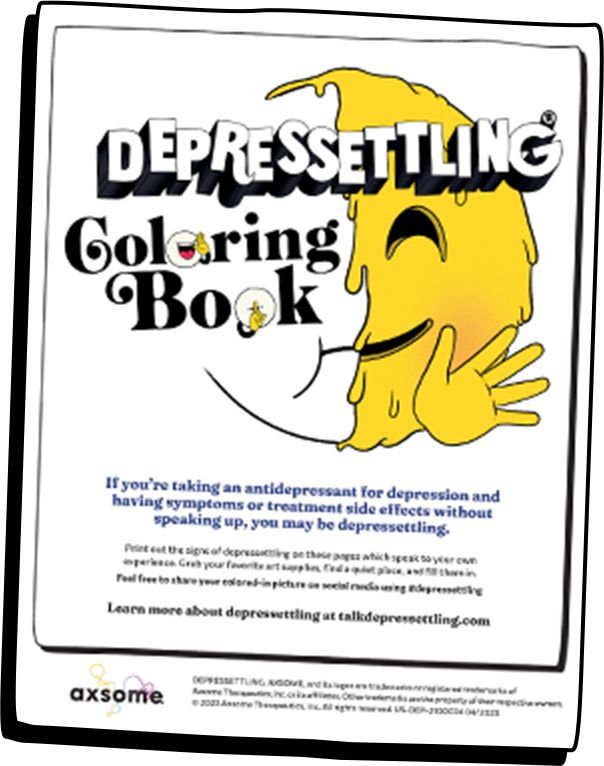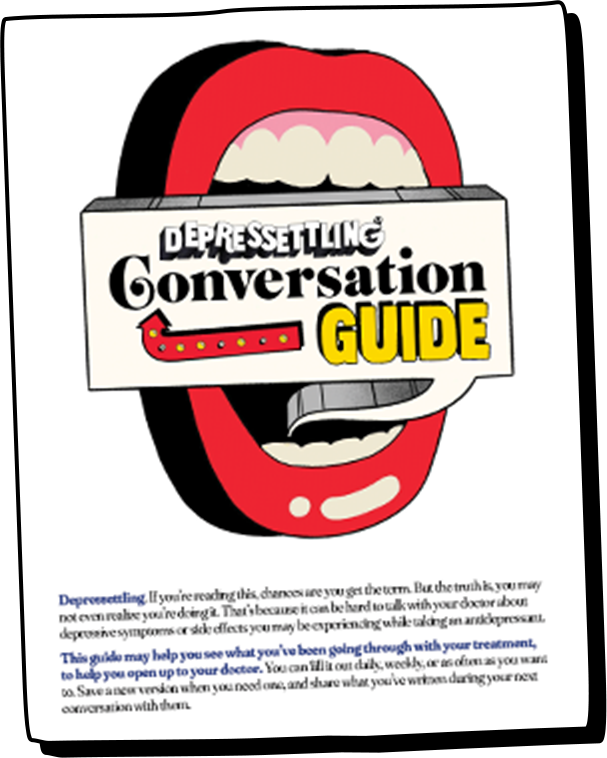
When someone is taking an
antidepressant for depression
accepting symptoms or side
effects without speaking up
Depressettling
(de • PRESS • seh • tuh • ling)
Related phrases include:





Antidepressants can help many people with depression. But for some, they can have limitations too. If you're still having depressive symptoms or experiencing side effects, it can be hard to open up about them. You might brush them off, or put off talking to your doctor.
Whether you realize it or not,
you might be depressettling.

Having ongoing
conversations with your doctor
is a crucial part of your treatment.
And remember, you should not
stop taking an antidepressant
without talking to your doctor first.



Before we get into it,
some important stuff to cover:

You should not stop taking an antidepressant without talking to your doctor first.

You might have hoped your antidepressant would take effect right away, but they can take a while to work.

2/3 of people did not achieve remission from their depression — that is, did not become symptom-free — after an initial treatment with a standard antidepressant in a large study from the National Institute of Mental Health.*
Remission is an important goal of depression treatment, so talk to your doctor about what's working and what isn't.
*Based on a study of 2,876 people diagnosed with depression. The study had 4 stages; each tested a different medication/medication combination. The primary goal of each stage was to see if the treatment used could adequately treat participants' depression.

Depression is a common mood
disorder - we're talking about

U.S. adults with depressive symptoms.* That’s a lot of people.
So you’re definitely not alone.
*In 2021, 21 million adults in the U.S. had
at least one major depressive episode.
Stuck with frustrating depressive symptoms & haven't spoken up? You might be depressettling.
If you've been diagnosed with depression, you know the deal: the symptoms can affect how you think and feel, and may get in the way of your sleep, eating, and work.
Whether you’re newer on the scene or you know ‘em all too well, here’s a recap of symptoms you might have:
Feeling sad or having a low mood
Loss of interest or pleasure in doing things you used to like
Changes in your appetite — weight loss or gain that’s not related to dieting
Trouble sleeping or sleeping too much
Feeling worthless or guilty
Loss of energy or feeling more tired
Moving or talking more slowly or, being more restless or fidgety (so much so that others can notice)
Having trouble concentrating, thinking or
making decisions
Having thoughts of death or suicide
It's important to seek a healthcare professional's advice to talk about your specific symptoms and/or a depression diagnosis.
Get help immediately if you're having thoughts of suicide by getting in touch with your healthcare professional or calling the National Suicide Prevention Lifeline at 1‑800‑273‑TALK (8255) — it's available 24 hours a day, 7 days a week and all calls are confidential.


Opening up to your doctor about what you’re going through with your treatment may not be the easiest thing to do. But it matters.
When it comes to depression treatment, there are many options — psychotherapy is one of them, antidepressants are another. They can also be used together.
If you're taking an antidepressant, you may find that it helps with some symptoms, yet leaves you with others. Or, it might have worked for a while, but then some symptoms came back. You shouldn't have to settle with them - that's why talking to your doctor is key to getting help.
Everyone's experience with depression is unique. Their treatment needs are, too. It's important to tell your doctor what you're going through.


Side effects bugging you but keeping it inside? You might be depressettling.
Antidepressants can help many people with depression.
But they may cause different side effects including:
Nausea
Sleep
Problems
Diarrhea
Vomiting
Sexual
Problems
Weight
Gain
Note:
Many side effects may lessen over time. Remember, you should not stop taking an antidepressant without talking to your doctor first.


It’s not uncommon for some types of antidepressants to cause sexual problems to both men and women. In a study looking at 10 antidepressants, 59% of people experienced sexual problems (the range based on the specific treatment was 4% to 73%).*
It’s not uncommon for some types of antidepressants to cause sexual problems to both men and women. In a study looking at
10 antidepressants, 59% of people experienced sexual problems (the range based on the specific treatment was 4% to 73%).*
So you’re not alone. But that doesn’t mean you have to settle
with it. Having open, honest conversations with your doctor is an important step toward getting the help you need.
*The study looked at the incidence of sexual problems with 10 antidepressants; those in the study were interviewed using a questionnaire which includes questions about libido, orgasm, ejaculation, erectile function, and general sexual satisfaction; 604/1022 experienced sexual problems overall.


Different antidepressants can have different effects on sleep.
While some may help you fall asleep faster and sleep longer, others can mess with sleep — for instance, you may have trouble falling asleep.
Letting your doctor know about any sleep problems you may have is an important step to getting help.
Letting your doctor know about any sleep problems you may have is an important step to getting help.


Some antidepressants are more likely to lead to weight gain than others. Many can cause an initial weight loss, which may be followed by weight gain.*
Some antidepressants are more likely to lead to weight gain than others. Many can cause an initial weight loss, which may be followed by weight gain.*
Talk to your doctor about how weight changes may be affecting you.
*Based on a review of 116 studies involving 17 antidepressants.
Talk to your doctor about how weight changes may be affecting you.
*Based on a review of 116 studies involving 17 antidepressants.

17% to 26% of people with depression who took certain antidepressants had nausea or stomach upset based on the results of two studies.
In one of the studies, 83% of people had nausea by 2 weeks, and 32% still had it 3 months later.
One study was based on a telephone survey of 401 people with depression taking one of four antidepressants. The other was a review of 84 studies involving two types of antidepressants.
prev
1
2
3
4
next

If your treatment is causing uncomfortable side effects, don't just cope. Letting your doctor know what you're going through is an important step toward getting help.



Getting detailed with your healthcare professional about what you're going through with your treatment will help them find the best option for you.
It may take time to find the right dose. Or, you may need to try more than one treatment before you find one that works. But that doesn't mean the treatment for you isn't out there.


We also have two helpful resources to get you started.

MHA
While depressettling can happen in different ways, the Depressettling Coloring Book could help you recognize signs that speak to your experiences. Just print out the relevant pages and get coloring to identify them.
Get The Book

MHA
Talking about depression symptoms you may still be experiencing can be hard. The Depressettling Conversation Guide is a free resource that helps you get the conversation started with your doctor.
Get The Guide


For more support, have a look at the sites from these organizations:

MHA
Mental Health America (MHA) is the nation’s leading community-based nonprofit dedicated to addressing the needs of those living with mental illness and promoting the overall mental health of all.

DBSA
The Depression and Bipolar Support Alliance (DBSA) is a leading national peer-focused mental health organization, whose mission is to provide hope, help, support, and education for individuals who live with mood disorders.


Along with talking to your doctor
about your treatment options, here are some all-around healthy ideas to add to the convo:
Our bodies want well balanced meals: listening is good.
Can be hard to concentrate or generally feel OK without it.
We all know - for most people, it's good to fit it into their routine. And in some people with depression who do aerobic exercise or resistance training, depressive symptoms may improve, at least a little. Of course, everyone is different and it's important to talk to your doctor before starting any exercise plan.
On caffeine, tobacco and alcohol - Generally smart to eliminate or limit.
prev
1
2
3
4
next
How Axsome is
taking action
We understand the real struggles with depression.
And we know there's a real need for more conversations about it.
We're committed to helping foster open, ongoing discussions between people with depression and their healthcare professionals.
And we're dedicated to creating resources for depression education, empowerment, and support.
You shouldn't have to keep

Talking to your doctor is an important step to getting the help you need.




You're about to say "see ya"
to depressettling.com
(we hope you say "heya" to a convo with your doctor)
You'll now be sent to a website that's not controlled or owned by Axsome Therapeutics, Inc.
Axsome Therapeutics, Inc. isn't responsible or liable for the website you're about to go to, which may not be appropriate for everyone.

